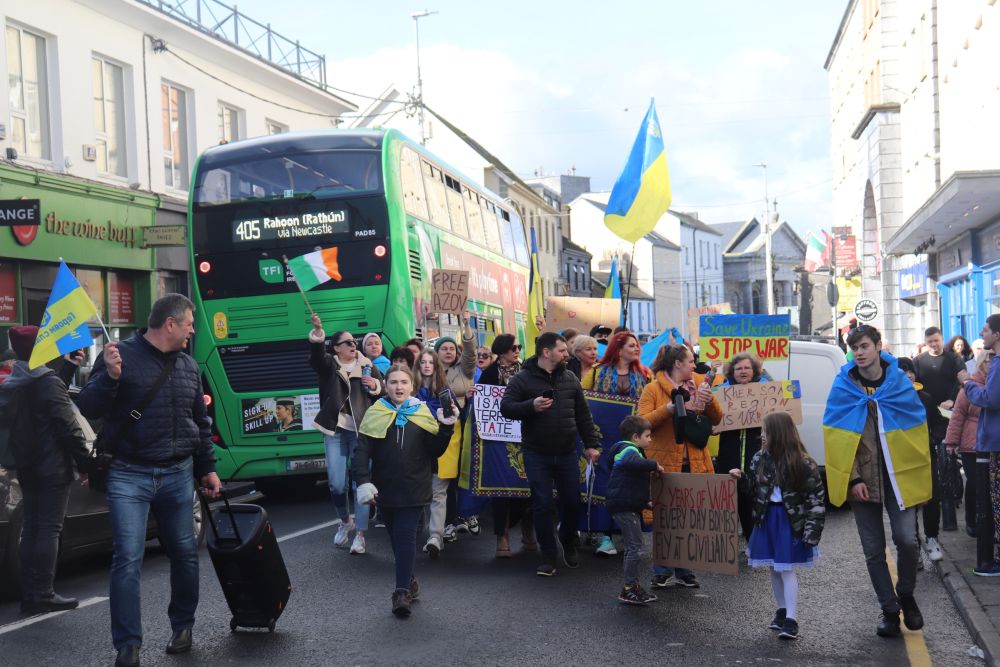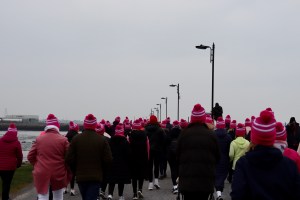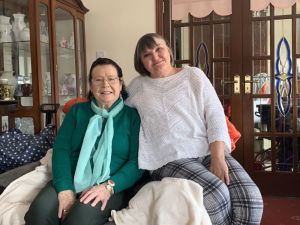Gratitude and uncertainty at Galway demonstration for Ukraine as war enters third year

Demonstration for Ukraine, Galway. Photo: NUIG Newsroom
A demonstration commemorating two years since Russia invaded Ukraine took place in Galway.
Over 150 Ukrainians and their supporters gathered outside of Galway Cathedral on Saturday and marched through Galway City centre to show solidarity with Ukraine’s ongoing struggle.
“War has changed each of us, shattered our dreams and hope and stole our lives,” said Andrii Turchyn at the demonstration. His brother, a soldier in the Ukrainian army, was taken hostage by Russian forces in the siege of Mariupol.
“He’s a part of the Azov brigade. To Russia, Azov people are like ISIS, terrorists. But to Ukraine they are the biggest heroes,” he said.
Andrii moved to Ireland in April 2022, and had assisted in evacuating his brother’s family to Ireland from the besieged city.
“Being here, I’m happy to have a chance to speak to the world, and I’m terrified and angry and sad war has continued in Ukraine for two years now.”
The demonstrators voiced their gratitude to Ireland for taking in Ukrainian refugees after the invasion.
Lyudmyla Sivochenko, who moved to Ireland two years ago, said the country’s support was “palpable”.
“It’s surpassed all our expectations,” she said.
“I’ve been to many countries, but the warm welcome that the Irish people have shown us is unparalleled.”
Barriers to integration
According to the latest data from the Central Statistics Office (CSO), as of 4 February 2024, over 104,000 Ukrainians have arrived in Ireland after the start of Russia’s invasion of Ukraine.
In Galway City, the number of Ukrainian arrivals totalled 1,345 people, which corresponds to 4.5 per cent of the electoral area’s population.
31 per cent of all Ukrainian refugees are under 20 years old.
Alisa Driuk was ten when she came to Ireland from Dnipro in eastern Ukraine in April 2022.
Her father and grandparents continue to live in Dnipro, despite the city being “unsafe”, according to Alisa.
“I worry about them very much,” she said.
English was a major hurdle for Alisa in acclimating to living in Ireland.
“At first it was tough for me because I couldn’t understand people, even though I have experience speaking English. But I’ve adapted, and now I can speak to people,” she said.
Language barriers
According to Olena Domina, a Ukrainian Support Worker at Galway Volunteer Centre, mastery of English is a major hurdle for Ukrainians in Ireland, alongside access to accommodation.
“English language practice is our most requested services, and one of the biggest barriers to integration,” she said.
“To integrate, you have to at least be willing to speak.”
Ms Domina moved to Ireland from Kyiv in March 2022 with her three children, and has since worked to help Ukrainians integrate into the local community in Galway. She has offered translation services, organised networking events as well as literature and conversation clubs.
She has also run masterclasses for people in Ireland to better understand Ukrainian culture and history.
Ms Domina, who has herself been hosted by an Irish family, was inspired by observing cultural differences between Ukrainians and their Irish hosts.
“For example, Ukrainians find it odd how Irish children are never left unattended at home, and how they go without smartphones at age twelve.”
Awareness of these different cultural modes can pre-empt tension between Ukrainians and their Irish hosts and aid in community integration, according to Ms Domina.
Hosting refugees
Around 25 per cent of Ukrainian refugees in Ireland live with Irish hosts, according to a survey by Helping Irish Hosts (HIH).
“It’s a huge part of Ireland’s accommodation response,” said Roz Jones, communications lead for HIH.
HIH was started by a group of hosts who were hosting Ukrainians in the wake of Russia’s invasion. The organisation, which connects Ukrainian refugees with hosts, has since grown to a team of over 25 people.
Their survey, which included more than a thousand hosts in Ireland, showed that 92 per cent of hosts polled expressed having a positive hosting experience.
“We didn’t think it would be this high,” she said. “It’s great.”
According to Ms Jones, 80 per cent of hosts ended up extending the length of time they were willing to host Ukrainians.
She believes that people find it fulfilling to host a refugee of war.
“You’re watching the war in Ukraine unfold on the news, and it’s obviously very sad and depressing.
“But to be able to directly take action, to directly impact another person’s life and see the impact every day is really special,” she said.
Uncertain future
With the war extending into its third year, the future remains uncertain for Ukrainians in Ireland.
“I have a lot of friends who are still in Ukraine, living in fear,” said Mr Turchyn. “Some have accepted not knowing if they’ll be alive tomorrow.”
He added, “It’s not getting any better. The world should react to Russia and treat them as a terrorist state, and act to eliminate [President] Putin.”
Alisa meanwhile wished to see her extended family in Ukraine.
“I really want to go back and meet them,” she said.
The number of Ukrainians attending events at Galway Volunteer Centre has fallen, which Ms Domina sees as a sign of their successful integration into the community.
“Many people have taken up work, especially in the hospitality sphere or in services: nails salons, hair dressers, tailors, and so on.”
According to her, an estimated 30 per cent of Ukrainian refugees will choose to stay and integrate, but that number may change depending on the war’s outcome.
Government limits
At the end of last year, the Irish government approved a limit of 90 days on the time incoming Ukrainian refugees will be provided with accommodation. Additionally, their social welfare payments while in state-provided accommodation were slashed from €220 per week down to €38.80.
Ms Jones said that the policy will put people at risk.
“[HIH] has repeatedly asked the government to reconsider the new policy,” she said.
“Hosting works very well for some people, but it’s not the solution for everyone. There are people with additional needs – health needs and complex mental health needs – that aren’t suited to hosting.”
She said that demand for hosted accommodation will rise as a result, while the number of hosts will remain limited.
During an Oireachtas Briefing Presentation, HIH called on the government to develop a long-term plan in regards to accommodation options for asylum seekers.
“Then both guests and hosts can start to plan what is next in their lives”, Ms Jones said.







